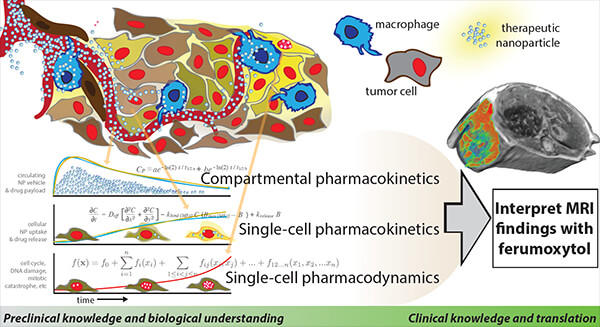Massachusetts General Hospital and Harvard Univeristy — Imaging of Nanotherapeutic Drug Action
Principal Investigators: Ralph Weissleder, M.D., Ph.D.
Co-Investigators: Mikael Pittet, Ph.D., Cesar Castro, M.D., and Claudio Vinegoni, Ph.D.
Project Summary
Well over a thousand patients have now received chemically distinct, nano-encapsulated chemotherapeutics, generally showing lower toxicity, increased tumoral accumulation of payloads and occasionally improved progression free survival. Experimentally, an even larger number of new constructs and approaches have been pioneered by the NCI Alliance for Nanotechnology in cancer members, as well as other groups. Testing in mice usually involves measuring tumor sizes, survival or the use of histopathology and other molecular diagnostics. Yet, despite these advances, much less is known in the in vivo setting, as to how these nanomaterials actually work or fail, what the spatial and temporal heterogeneity is and how efficacy can be improved. Armed with new biological insight from recent feasibility studies leading to this application and the recent developments of new in vivo imaging technologies we are now able to address these important cancer nanotechnology questions in ways that were not previously possible.
The goal of this project is to perform in vivo imaging analyses of therapeutic nanoparticles (TNP), addressing key questions on nanoparticle distribution (pharmacokinetics, PK) and cellular response (pharmacodynamics, PD). Specifically, we will elucidate the following questions i) why aren't current clinical TNP more efficient (aim 1); ii) how much does tumor targeting with affinity ligands help to improve efficacy (aim 2) and iii) can we select responders from non-responders by nanoparticle enhanced MR imaging (aim 3)? We hypothesize that a considerable proportion of tumor cell accumulation is mediated by tumoral myeloid cells (macrophages) rather than by cancer cells, offering a new strategy to further enhance efficacy. Furthermore, the project is complementary to existing Alliance projects and will be useful to other Alliance members across the consortium through future interactions. It will also provide a much needed biological understanding of nanoparticle enhanced MR imaging findings to interpret clinical data.
Project Expertise
The project team includes expertise in nanomedicines, chemistry, multimodality imaging, and molecular / cell / cancer biology.
